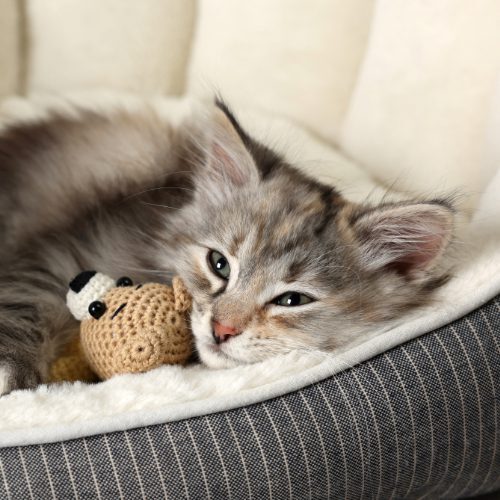

Kitten Wellness Care Nurturing Kitten Care in Boston, MA
We are thrilled to welcome your new furry friend to Back Bay Veterinary Clinic!
We’ve prepared this collection of information and links to help you settle into life with your new kitten. Please review this before your first appointment with us. We have extra time set aside during this appointment to answer all of your questions!

Veterinary Visit Checklist
for Your Kitten!
Vaccines
- FVRCP (Feline Viral Rhinotracheitis, Calicivirus, and Panleukopenia) - series of injectable or intranasal vaccines given every 2 to 4 weeks until the kitten is at least 16 weeks old, and then again at 6 months old. Needs to be boostered every 1 to 3 years in adulthood.
- Rabies - one injectable vaccine, lasts for 1 year. Legally must be given between 12 weeks and 6 months old. Needs to be boostered every 3 years in adulthood.
- FeLV (Feline Leukemia Virus) - series of 2 injectable vaccines, given 2 to 4 weeks apart. Vaccine for FeLV will be continued in adulthood only if your cat is at risk for this disease by free roaming outdoors, boarding in a group situation, or living in a household with other outdoor cats.
Deworming
- Your kitten will be treated with the broad spectrum topical deworming medication Profender at their first kitten visit to prophylactically treat for common intestinal parasites.
Preventative Diagnostic testing
- Two fecal tests at least 2 weeks apart to check for GI parasites.
- Blood test for viral diseases feline leukemia virus (FeLV) and feline immunodeficiency virus (FIV) will be done around 3 to 6 months old. Often this is done at the same time as the blood draw for the pre-anesthetic lab work. We may recommend repeating this test, depending on your individual cat’s risk level.
- Heartworm blood test may be recommended around 7 months of age or at the first annual adult exam if your kitten is from the Southeast U.S. or other region with high rates of heartworm disease. Annual testing may be recommended for high-risk cats with an outdoor lifestyle.
- Pre-anesthetic blood test is done before spay or neuter surgery to make sure your kitten is healthy enough to go under anesthesia.
Along with trimming nails and giving preventatives, one of the most important routines to establish with your new kitten is brushing teeth. Aim for every day, but even twice a week is amazing!
Even with the best dental care at home, most cats will need regular anesthetic cleanings and oral health assessments and treatments to keep their mouths healthy, including the parts below the gumline that we can’t see. We will perform an oral exam every six months as part of your cat’s preventive care exam, and make individualized recommendations for when a cleaning is needed.
Stress is a major source of illness for indoor cats. Lack of stimulation and enrichment can lead to urinary issues, overgrooming, and obesity. We recommend reviewing the information available from the Indoor Cat Initiative to learn more about how to make your home cat-friendly and how to play and interact with your cat in positive ways. Socialization is important for kittens, too; check out the Fear Free Kitten Socialization Bingo for more information. It’s also important to give your kitten surfaces to scratch in a healthy, appropriate way.
Back Bay Veterinary Clinic is a certified Fear Free hospital. We typically use a variety of treats and toys to make each visit a happy experience for your kitten; please let us know if your kitten or anyone in your family has allergies.
You can take action to make each trip Fear Free before your kitten sets foot on the front steps of our clinic. Please review the following information to help make sure your kitten will be as happy to see us as we are to see them!
In the Fear Free Happy Homes content library, you can also find a collection of resources reviewed by board-certified veterinary behaviorists - and check out this video for a more comprehensive how-to demo on nail trims. We know these are hot topics for all new cat owners!

One of the questions we get most often is: what should I feed my kitten? You know that good nutrition is essential for proper growth and development. We recommend canned food as the primary source of nutrition for cats due to the decreased risk of urinary problems and diabetes. However, some owners find it useful to supplement with dry kibble, especially if an automatic feeder is necessary to maintain a feeding schedule (or prevent early morning wake-ups). Tools like the Indoor Hunting Feeder can also be helpful for environmental enrichment.
In general, we believe in the quality control and research that goes into manufacturing the food at the “big three” companies: Royal Canin, Hills Science Diet, and Purina. However, there are a lot of other good foods on the market beyond these three - so many that it’s hard for us to keep up! So, it’s important for you to know what to look for when selecting a pet food. Keep in mind that small-batch isn’t necessarily better when it comes to food, and byproducts isn’t a dirty word!
Of course, what goes in must go out - and we want it to stay in the proper place! Choosing the correct type and placement of the litter box is key to avoiding unwanted eliminations around the house. If your cat is consistently eliminating outside the box, he or she should be seen for an exam to rule out a medical issue.
Please note that if your male cat is ever repeatedly attempting to urinate without producing urine, that is an emergency, and he should be seen by a veterinarian right away!
The microchip is a small, rice-sized transmitter that can be scanned by any vet or shelter and used to help reunite you with your pet in the case of accidental separation. It is usually placed under the skin at the time of spay or neuter but can be done during any appointment.
If you plan to travel abroad with your cat, we recommend placing the microchip before the rabies vaccine due to international requirements of some countries.
If the microchip is placed in our clinic, we can register it for you at HomeAgain using your contact information on file. If your pet already has a microchip placed by the breeder or shelter, make sure you register it. It’s important to keep your contact information up to date with the registration company, since that is how you will be contacted if your pet is found!
If you’re not sure whether your pet’s microchip is registered already, you can use the free universal microchip lookup tool to find out. When choosing where to register your microchip, we recommend using one of the companies that participate in that tool.
We whole-heartedly recommend pet insurance. The independent Pet Insurance Review site may be helpful in comparing plans. We recommend selecting three insurance companies to get quotes from. Be sure to read the fine print!
While you research and select an insurance company, we recommend enrolling in a free trial of Trupanion pet insurance - there is no auto-renewal (meaning they don’t take your credit card information), but it will provide coverage with no waiting period for 30 days while you consider your options. Ask at checkout if you would like us to send you the link for this trial, and be sure to enroll within 24 hours of your exam.
We follow the Fix By Five guideline supported by AAHA, AAFP, and AVMA, and recommend spay or neuter surgery at 5 months old for all cats.

If you’re thinking about hiring someone to help take care of your new furry family member, it’s natural to have some anxiety about the process.
We have lists of some local pet sitters and boarding facilities available but cannot make any guarantees of quality, for liability reasons. We hope you understand!

Emergencies
If your cat has ingested something potentially toxic, we recommend contacting the ASPCA Poison Control Hotline at (888) 426-4435. If necessary, they will give you a case number that you can reference when you follow up with any veterinary hospital. You can also search the ASPCA website for the to find out what plants and food items are toxic.
Some of the most common poisonings we see are from the following items, but this is by no means a complete list:
- Lilies
- Grapes / raisins
- Garlic / onions
- Antifreeze
- Marijuana
- Human medications, including tylenol or ibuprofen
- Xylitol, an artificial sweetener
- Liquid potpourri
If your pet has a serious emergency outside of our normal business hours, please bring them to one of the following locations:
- Angell Animal Medical Center 350 S. Huntington Ave, Jamaica Plain, MA 02130 (617) 522-7282
- BluePearl - Charlestown 56 Roland St, Boston, MA 02129 (617) 284-9777
- Veterinary Emergency Group (VEG) - Boston 312-316 Stuart St, Boston, MA 02116 (617) 762-0001
If you’re outside of Boston, other local emergency hospitals include:
- Massachusetts Veterinary Referral Hospital, 20 Cabot Rd, Woburn, MA 01801 (781) 932-5802
- BluePearl - Waltham, 180 Bear Hill Rd, Waltham, MA, 02451 (781) 684-8387
- Veterinary Emergency Group, 165 Needham St, Newton, MA 02464 (617) 729-4446
- Foster Hospital at Tufts University, 200 Westboro Rd, North Grafton, MA 01536 (508) 839-5302
- Tufts VETS, 525 South St, Walpole, MA, 02081 (508) 668-5454
- VCA South Shore, 595 Columbian St, South Weymouth, MA, 02190 (781) 337-6622
If our clinic is closed, and you’re not sure whether your puppy’s emergency is serious enough for a visit to the emergency clinic or whether it can wait until the next day, you can call us at (617) 247-2273 and speak with GuardianVets, our after-hours triage service staffed by licensed veterinary technicians.
